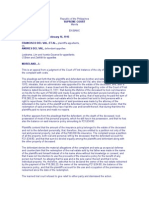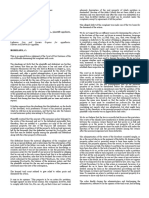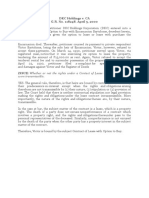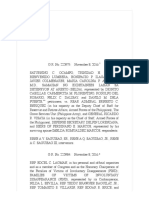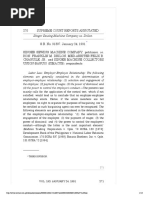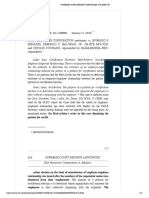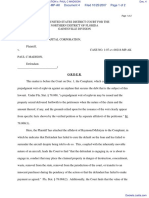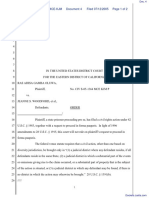(No. 9374. February 16, 1915.) FRANCISCO DEL VAL ET AL., Plaintiffs and Appellants
(No. 9374. February 16, 1915.) FRANCISCO DEL VAL ET AL., Plaintiffs and Appellants
Uploaded by
joyeduardoCopyright:
Available Formats
(No. 9374. February 16, 1915.) FRANCISCO DEL VAL ET AL., Plaintiffs and Appellants
(No. 9374. February 16, 1915.) FRANCISCO DEL VAL ET AL., Plaintiffs and Appellants
Uploaded by
joyeduardoOriginal Description:
Original Title
Copyright
Available Formats
Share this document
Did you find this document useful?
Is this content inappropriate?
Copyright:
Available Formats
(No. 9374. February 16, 1915.) FRANCISCO DEL VAL ET AL., Plaintiffs and Appellants
(No. 9374. February 16, 1915.) FRANCISCO DEL VAL ET AL., Plaintiffs and Appellants
Uploaded by
joyeduardoCopyright:
Available Formats
[No. 9374. February 16, 1915.
FRANCISCO DEL VAL ET AL., plaintiffs and appellants,
vs. ANDRES DEL, VAL, defendant and appellee.
1. PLEADING; DEFECTS IN COMPLAINT; CURE.·Even
though a complaint is defective to the extent of failing to
allege facts sufficient to constitute a cause of action, if, on
the trial of the cause, evidence is offered which establishes
the cause of action which it was intended the complaint
should allege, and such evidence is received without
objection, the defect is thereby cured and cannot be made
the ground of a subsequent objection.
2. ID.; ID.; ID.·An objection, made after trial, that the
complaint in an action in partition was defective in that it
failed to describe the lands sought to be partitioned, is
unavailing, where it appears that evidence was introduced
on the trial, without objection, clearly describing the real
estate sought to be partitioned.
3. PARTITION OF PERSONAL PROPERTY; JURISDICTION
OF COURT OF FIRST INSTANCE.·The Courts of First
Instance of the Philippine Islands have jurisdiction to divide
personal property between the common owners thereof. If
actual partition thereof cannot be made, it may be sold
under the direction of the court and the proceeds divided
among the owners after the necessary expenses have been
deducted.
4. PARTITION OF REAL PROPERTY; JURISDICTION OF
COURT OF FIRST INSTANCE.·The court has no
authority to partition real property among the common
owners thereof without a proceeding in proper form begun
by one or more of such owners.
5. PARTITION; ORDER DISCHARGING ADMINISTRATOR
NO BAR TO SUBSEQUENT ACTION.·The heirs of real
and personal property have the right to ask the probate
court to turn such property over to them without division;
and where such request is unanimous, it is the duty of the
court to comply with it and
535
VOL. 29, FEBRUARY 16, 1915. 535
Del Val vs. Del Val.
there is nothing in section 753 of the Code of Civil
Procedure which prohibits it. In case the property is turned
over to the heirs by the probate court in bulk and without
division, an order finally settling the estate and discharging
the administrator is not a bar to a subsequent action for a
division of either the real or personal property among the
heirs as owners thereof.
6. JUDGMENT; PLEA OF "RES JUDICATA."·The defense of
res judicata, to be available, must be pleaded" or the facts
demonstrating its existence must be proved on the trial
without objection.
7. LIFE INSURANCE; PROCEEDS; HEIR AS
BENEFICIARY.·Where a life-insurance policy is made
payable to one of the heirs of the person whose life is
insured, the proceeds of the policy on the death of the
insured belong exclusively to the beneficiary and not to the
estate of the person whose life was insured; and such
proceeds are his individual property and not the property of
the heirs of the person whose life was insured.
8. ID.; ID.; ID.; ARTICLE 1035, CIVIL CODE.·Article 1035 of
the Civil Code, providing that "an heir by force of law
surviving with others of the same character to a succession
must bring into the hereditary estate the property or
securities he may have received from the deceased during
the life of the same, by way of dowry, gift, or for any good
consideration, in order to compute it in fixing the legal
portions and in the account of the division," is not applicable
to the proceeds of an insurance policy made payable to one
of the heirs of the insured by name, nor can the proceeds of
such a policy be considered a gift under article 819 of the
Civil Code.
9. ID.; ID.; ID.; CODE OF COMMERCE.·The contract of life
insurance is ?. special contract and the destination of the
proceeds thereof is determined by special laws which deal
exclusively with that subject. The Civil Code has no
provisions which relate directly and specifically to life-
insurance contracts or to the destination of life-insurance
proceeds. That subject is regulated exclusively by the Code
of Commerce, which provides for the terms of the contract,
the relations of the parties and the destination of the
proceeds of the policy.
APPEAL from a judgment of the Court of First Instance of
Manila. Lobingier, J.
The facts are stated in the opinion of the court.
Ledesma, Lim & Irureta Goyena for appellants.
O'Brien & DeWitt for appellee.
536
536 PHILIPPINE REPORTS ANNOTATED
Del Val vs. Del Val
MORELAND, J.:
This is an appeal from a judgment of the Court of First
Instance of the city of Manila dismissing the complaint
with costs.
The pleadings set forth that the plaintiffs and defendant
are brothers and sisters; that they are the only heirs at law
and next of kin of Gregorio Nacianceno del Val, who died in
Manila on August 4, 1910, intestate; that an administrator
was appointed for the estate of the deceased, and, after a
partial administration, it was closed and the administrator
discharged by order of the Court of First Instance dated
December 9, 1911; that during the lifetime of the deceased
he took out insurance on his life for the sum of P40,000 and
made it payable to the defendant as sole beneficiary; that
after his death the defendant collected the face of the
policy; that of said policy he paid the sum of P18,36.5.20 to
redeem certain real estate which the decedent had sold to
third persons with a right to repurchase; that the
redemption of said premises was made by the attorney of
the defendant in the name of the plaintiffs and the
defendant as heirs of the deceased vendor; that the
redemption in the name of the plaintiffs was, so defendant
declares, without his knowledge or consent; that since the
redemption of said premises they have been in the
possession of the plaintiffs, who have had the use and
benefit thereof; that during that time the plaintiffs paid no
taxes and made no repairs.
It further appears from the pleadings that the
defendant, on the death of the deceased, took possession of
most of his personal property, which he still has in his
possession, and that he has also the balance on said
insurance policy amounting to P21,634.80.
Plaintiffs contend that the amount of the insurance
policy belonged to the estate of the deceased and not to the
defendant personally; that, therefore, they are entitled to a
partition not only of the real and personal property, but
also of the P40,000 life insurance. The complaint prays a
537
VOL. 29, FEBRUARY 16, 1915. 537
Del Val vs. Del Val
partition of all the property, both real and personal, left by
the deceased; that the defendant account for P21,634.80,
and that that sum be divided equally among the plaintiffs
and defendant along with the other property of deceased,
The defendant denies the material allegations of the
complaint and sets up as special defense and counterclaim
that the redemption of the real estate sold by his father
was made in the name of the plaintiffs and himself instead
of in his name alone without his knowledge or consent; and
that it was not his intention to use the proceeds of the
insurance policy for the benefit of any person but himself,
he alleging that he was and is the sole owner thereof and
that it is his individual property. He, therefore, asks that
he be declared the owner of the real estate redeemed by the
payment of the P18,365.20, the owner .of the remaining
P21,634.80, the balance of the insurance policy, and that
the plaintiffs account for the use and occupation of the
premises so redeemed since the date of the redemption.
The learned trial court refused to give relief to either
party and dismissed the action.
It says in its opinion: "This purports to be an action for
partition, brought against an heir by his coheirs. The
complaint, however, fails to comply with Code Civ. Pro. sec.
183, in that it does not 'contain an adequate description of
the real property of which partition is demanded/ Because
of this defect (which has not been called to our attention
and was discovered only after the cause was submitted) it
is more than doubtful whether any relief can be awarded
under the complaint, except by agreement of all the
parties."
This alleged defect of the complaint was made one of the
two bases for the dismissal of the action.
We do not regard this as sufficient reason for dismissing
the action. It is the doctrine of this court, set. down in
several decisions, Lizarraga Hermanos vs. Yap Tico, 24
Phil. Rep., 504, that, even though the complaint is defective
to the extent of failing in allegations necessary to
constitute a cause of action, if, on the trial of the cause,
evidence is
538
538 PHILIPPINE REPORTS ANNOTATED
Del Val vs. Del Val.
offered which establishes the cause of action which the
complaint intended to allege, and such evidence is received
without objection, the defect is thereby cured and cannot be
made the ground of a subsequent objection. If, therefore,
evidence was introduced on the trial in this case definitely
and clearly describing the real estate sought to be
partitioned, the defect in the complaint was cured in that
regard and should not have been used to dismiss the
action. We do not stop to inquire whether such evidence
was or was not introduced on the trial, inasmuch as this
case must be returned for a new trial with opportunity to
both parties to present such evidence as is necessary to
establish their respective claims.
The court in its decision further says: "It will be noticed
that the provision above quoted refers exclusively to real
estate. * * * It is, in other words, an exclusive real property
action, and the institution thereof gives the court no
jurisdiction over chattels. * * * But no relief could possibly
be granted in this action as to any property except the last
(real estate), for the law contemplated that all the personal
property of an estate be distributed before the
administration is closed. Indeed, it is only in exceptional
cases that the partition of the real estate is provided for,
and this too is evidently intended to be effected as a part of
the administration, but here the complaint alleges that the
estate was finally closed on December 9, 1911, and we find
upon referring to the record in that case that subsequent
motions to reopen the same were denied; so that the matter
of the distribution of the personal property at least must be
considered res judicata (for the final judgment in the
administration proceedings must be treated as concluding
not merely what was adjudicated, but what might have
been). So far, therefore, as the personal property at least is
concerned, plaintiffs' only remedy was an appeal from said
order."
We do not believe that the law is correctly laid down in
this quotation. The courts of the Islands have jurisdiction
to divide personal property between the common owners
539
VOL. 29, FEBRUARY 16, 1915. 539
Del Val vs. Del Val.
thereof and that power is as full and complete as is the
power to partition real property. If an actual partition of
personal property cannot be made it will be sold under the
direction of the court and the proceeds divided among the
owners after the necessary expenses have been deducted.
The administration of the estate of the decedent
consisted simply, so far as the record shows, in the payment
of the debts. No division of the property, either real or
personal, seems to have been made. On the contrary, the
property appears, from the record, to have been turned
over to the heirs in bulk. The failure to partition the real
property may have been due either to the lack of request to
the court by one or more of the heirs to do so, as the court
has no authority to make a partition of the real estate
without such request; or it may have been due to the fact
that all the real property of decedent had been sold under
pacto de retro and that, therefore, he was not the owner of
any real estate at the time of his death. As to the personal
property, it does not appear that it was disposed of in the
manner provided by law. (Sec. 753, Code of Civil
Procedure.) So far as this action is concerned, however, it is
sufficient for us to know that none of the property was
actually divided among the heirs in the administration
proceedings and that they remain coöwners and tenants-
incommon thereof at the present time. To maintain an
action to partition real or personal property it is necessary
to show only that it is owned in common.
The order finally closing the administration and
discharging the administrator, referred to in the opinion of
the trial court, has nothing to do with the division of either
the real or the personal property. The heirs have the right
to ask the probate court to turn over to them both the real
and personal property without division; and where that
request is unanimous it is the duty of the court to comply
with it, and there is nothing in section 753 of the Code of
Civil Procedure which prohibits it. In such case an order
finally settling the estate and discharging the
administrator would
540
540 PHILIPPINE REPORTS ANNOTATED
Del Val vs. Del Val.
not bar a subsequent action to require a division of either
the real or personal property. If, on the other hand, an
order had been made in the administration proceedings
dividing the personal or the real property, or both, among
the heirs, then it is quite possible that, to a subsequent
action brought by one of the heirs for a partition of the real
or personal property, or both, there could have been
interposed a plea of res judicata based on such order. As
the matter now stands, however, there is no ground on
which to base such a plea. Moreover, no such plea has been
made and no evidence offered to support it.
With the finding of the trial court that the proceeds of
the life-insurance policy belong exclusively to the defendant
as his individual and separate property, we agree. That the
proceeds of an insurance policy belong exclusively to the
beneficiary and not to the estate of the person whose life
was insured, and that such proceeds are the separate and
individual property of the beneficiary, and not of the heirs
of the person whose life was insured, is the doctrine in
America. We believe that the same doctrine obtains in
these Islands by virtue of section 428 of the Code of
Commerce, which reads:
"The amounts which the underwriter must deliver to the person
insured, in fulfillment of the contract, shall be the property of the
latter, even against the claims of the legitimate heirs or creditors of
any kind whatsoever of the person who effected the insurance in
favor of the former."
It is claimed by the attorney for the plaintiffs that the
section just quoted is subordinated to the provisions of the
Civil Code as found in article 1035. This article reads:
"An heir by force of law surviving with others of the same character
to a succession must bring into the hereditary estate the property or
securities he may have received from the deceased during the life of
the same, by way of dowry, gift, or for any good consideration, in
order to compute it in fixing the legal portions and in the account of
the division."
Counsel also claims that the proceeds of the insurance
541
VOL. 29, FEBRUARY 16, 1915. 541
Del Val vs. Del Val.
policy were a donation or gift made by the father during his
lifetime to the defendant and that, as such, its ultimate
destination is determined by those provisions of the Civil
Code which relate to donations, especially article 819. This
article provides that "gifts made to children which are not
betterments shall be considered as part of their legal
portion."
We cannot agree with these contentions. The contract of
life insurance is a special contract and the destination of
the proceeds thereof is determined by special laws which
deal exclusively with that subject. The Civil Code has no
provisions which relate directly and specifically to life-
insurance contracts or to the destination of life insurance
proceeds. That subject is regulated exclusively by the Code
of Commerce which provides for the terms of the contract,
the relations of the parties and the destination of the
proceeds of the policy.
The proceeds of the life-insurance policy being the
exclusive property of the defendant and he having used a
portion thereof in the repurchase of the real estate sold by
the decedent prior to his death with right to repurchase,
and such repurchase having been made and the conveyance
taken in the names of all of the heirs instead of the
defendant alone, plaintiffs claim that the property belongs
to the heirs in common and not to the defendant alone.
We are not inclined to agree with this contention unless
the fact appear or be shown that the defendant acted as he
did with the intention that the other heirs should enjoy
with him the ownership of the estate·in other words, that
he proposed, in effect, to make a gift of the real estate to
the other heirs. If it is established by the evidence that that
was his intention and that the real estate was delivered to
the plaintiffs with that understanding, then it is probable
that their contention is correct and that they are entitled to
share equally with the defendant therein. If, however, it
appears from the evidence in the case that the conveyances
were taken in the name of the plaintiffs without his
knowledge or consent, or that it was not his intention to
make a
542
542 PHILIPPINE REPORTS ANNOTATED
Gilchrist vs. Cuddy.
gift to them of the real estate, then it belongs to him. If the
f acts are as stated, he has two remedies. The one is to
compel the plaintiffs to reconvey to him and the other is to
let the title stand with them and to recover f rom them the
sum he paid on their behalf.
For the complete and proper determination of the
questions at issue in this case, we are of the opinion that
the cause should be returned to the trial court with
instructions to permit the parties to frame such issues as
will permit the settlement of all the questions involved and
to introduce such evidence as may be necessary for the full
determination of the issues framed. Upon such issues and
evidence taken thereunder the court will decide the
questions involved according to the evidence, sobordinating
his conclusions of law to the rules laid down in this opinion.
We do not wish to be understood as having decided in
this opinion any question of fact which will arise on the
trial and be there in controversy. The trial court is left free
to find the facts as the evidence requires. To the f acts as so
f ound he will apply the law as herein laid down.
The judgment appealed from is set aside and the cause
returned to the Court of First Instance whence it came for
the purposes hereinabove stated. So ordered.
Arellano, C. J., and Carson, J., concur.
Torres, J., concurs in the result.
Araullo, J., concurs. (See page 624, post.)
Judgment set aside; case returned for further
proceedings.
_____________
© Copyright 2017 Central Book Supply, Inc. All rights reserved.
You might also like
- Simple Guide for Drafting of Civil Suits in IndiaFrom EverandSimple Guide for Drafting of Civil Suits in IndiaRating: 4.5 out of 5 stars4.5/5 (4)
- 2020.01.09 First Amended Complaint (110204177.1)Document6 pages2020.01.09 First Amended Complaint (110204177.1)Zac SlotemakerNo ratings yet
- Defendant's Verified Answer To Plaintiff's Verified ComplaintDocument11 pagesDefendant's Verified Answer To Plaintiff's Verified ComplaintBasseem100% (3)
- Jamaica - Civil - Procedure - Rules.2006Document636 pagesJamaica - Civil - Procedure - Rules.2006Robert Foster100% (4)
- Assignment No. 8 - Civrev PerfamDocument232 pagesAssignment No. 8 - Civrev PerfamptdwnhroNo ratings yet
- Assignment 8Document24 pagesAssignment 8Kriston LipatNo ratings yet
- 1 Del Val Vs Del Val Escra FTDocument4 pages1 Del Val Vs Del Val Escra FTDianne YcoNo ratings yet
- Supreme Court: Ledesma, Lim and Irureta Goyena For Appellants. O'Brien and Dewitt For AppelleeDocument44 pagesSupreme Court: Ledesma, Lim and Irureta Goyena For Appellants. O'Brien and Dewitt For Appelleemhilet_chiNo ratings yet
- Bpi VS PosadasDocument4 pagesBpi VS PosadasAna AdolfoNo ratings yet
- 64-Del Val v. Del ValDocument2 pages64-Del Val v. Del ValVanz AsoqueNo ratings yet
- Ledesma, Lim & Irureta Goyena For Appellants. O'Brien & Dewitt For AppelleeDocument4 pagesLedesma, Lim & Irureta Goyena For Appellants. O'Brien & Dewitt For AppelleeDianne YcoNo ratings yet
- Del Val Vs Del ValDocument2 pagesDel Val Vs Del ValWangyu KangNo ratings yet
- Ass. 8 CasesDocument24 pagesAss. 8 CasesMark Jason Crece AnteNo ratings yet
- Adille Vs CADocument2 pagesAdille Vs CAShielaMarie MalanoNo ratings yet
- Retro To Certain 3rd Persons, Period of Repurchase Being 3 Years, But She Died inDocument30 pagesRetro To Certain 3rd Persons, Period of Repurchase Being 3 Years, But She Died inMylaCambriNo ratings yet
- Adille Vs CADocument3 pagesAdille Vs CANina Khristinne D. AranetaNo ratings yet
- LTD #6Document81 pagesLTD #6DP ManguneNo ratings yet
- Property Midterms - ConsoDocument77 pagesProperty Midterms - ConsoAnonymous iScW9lNo ratings yet
- C. Statement of Personal Circumstances (Sec. 45) : Litam vs. EspirituDocument6 pagesC. Statement of Personal Circumstances (Sec. 45) : Litam vs. EspirituJillandroNo ratings yet
- Adille v. CA, 157 SCRA 455Document8 pagesAdille v. CA, 157 SCRA 455BernsNo ratings yet
- 124631-1998-Titong v. Court of Appeals20211018-12-1z0egv8Document11 pages124631-1998-Titong v. Court of Appeals20211018-12-1z0egv8Karl CabarlesNo ratings yet
- CCDocument33 pagesCCDolores PulisNo ratings yet
- 6 Isaguirre Vs de Lara PropertyDocument17 pages6 Isaguirre Vs de Lara Propertykikhay11No ratings yet
- Del Val V Del Val GDocument2 pagesDel Val V Del Val Gcristine jagodillaNo ratings yet
- Sigaya vs. Mayuga, G.R. No. 143254, 18 Aug 2005Document10 pagesSigaya vs. Mayuga, G.R. No. 143254, 18 Aug 2005info.ronspmNo ratings yet
- Mariano Vs CADocument3 pagesMariano Vs CApapaburgundyNo ratings yet
- 58 Titong v. CADocument10 pages58 Titong v. CASheryl CortesNo ratings yet
- Buitiong Vs PlazoDocument4 pagesBuitiong Vs PlazoAurora Pelagio Vallejos50% (2)
- Del Val V Del Val GDocument2 pagesDel Val V Del Val GRaks SanglitanNo ratings yet
- Plaintiff-Appellee vs. vs. Defendants Defendant-Appellant Emerito M. Salva & Associates The Law Firm of Volfango SalesDocument14 pagesPlaintiff-Appellee vs. vs. Defendants Defendant-Appellant Emerito M. Salva & Associates The Law Firm of Volfango SalesLDCNo ratings yet
- Practice Court Pre TrialDocument7 pagesPractice Court Pre TrialAJMordenoNo ratings yet
- Part IDocument8 pagesPart IIrish D DagmilNo ratings yet
- #19 Dy Yieng SEANGIO, Barbara D. SEANGIO and Virginia D. SEANGIODocument3 pages#19 Dy Yieng SEANGIO, Barbara D. SEANGIO and Virginia D. SEANGIOJui ProvidoNo ratings yet
- Adille v. Court of AppealsDocument7 pagesAdille v. Court of AppealsSitty MangNo ratings yet
- ANSWERDocument13 pagesANSWERArnel Bagsic TacasaNo ratings yet
- Del Val vs. Del Val (G.R. No. L-9374 February 16, 1915) - 4Document2 pagesDel Val vs. Del Val (G.R. No. L-9374 February 16, 1915) - 4eunice demaclidNo ratings yet
- Wills and Succession Case Doctrines 1st BatchDocument11 pagesWills and Succession Case Doctrines 1st BatchGigi SaldiviaNo ratings yet
- Adille Vs CaDocument4 pagesAdille Vs CaJR C Galido IIINo ratings yet
- Adille Vs CaDocument4 pagesAdille Vs CaJR C Galido IIINo ratings yet
- Adille Vs CADocument10 pagesAdille Vs CAGillian Elliot AlbayNo ratings yet
- Cases Civrev2salesDocument17 pagesCases Civrev2salesjealousmistressNo ratings yet
- Maneclang v. BaunDocument16 pagesManeclang v. BaunBart Teope GatonNo ratings yet
- DKC Holdings v. CA G.R. No. 118248. April 5, 2000Document11 pagesDKC Holdings v. CA G.R. No. 118248. April 5, 2000Krison LaforgaNo ratings yet
- POSITION PAPER - Cayton vs. TorresDocument7 pagesPOSITION PAPER - Cayton vs. TorresNonnatus P ChuaNo ratings yet
- Research On Prescription and LachesDocument3 pagesResearch On Prescription and LachesPaoloDimNo ratings yet
- Adille Vs CA - G.R. No. L-44546Document4 pagesAdille Vs CA - G.R. No. L-44546Glean Myrrh ValdeNo ratings yet
- Ross, Lawrence and Selph For Appellant. Camus and Delgado For AppelleeDocument12 pagesRoss, Lawrence and Selph For Appellant. Camus and Delgado For Appelleebrida athenaNo ratings yet
- 10 DIGEST Madrigal Shipping Vs OgilvieDocument4 pages10 DIGEST Madrigal Shipping Vs OgilvieXing Keet LuNo ratings yet
- Leoncio Lee Tek Sheng V CADocument3 pagesLeoncio Lee Tek Sheng V CAAnonymous mv3Y0KgNo ratings yet
- Adile Vs CaDocument4 pagesAdile Vs Cauvwevewvwvevwve ossasNo ratings yet
- Credit Transaction CasesDocument24 pagesCredit Transaction CasesJanice M. PolinarNo ratings yet
- Motion To Vacate Sample2Document8 pagesMotion To Vacate Sample2Melissa Covington100% (3)
- Acap Vs CADocument20 pagesAcap Vs CAJohnday MartirezNo ratings yet
- Digested Cases - Emmelie DemafilesDocument69 pagesDigested Cases - Emmelie DemafilesEmmelie DemafilesNo ratings yet
- Treyes V LarlarDocument14 pagesTreyes V LarlarJoatham GenovisNo ratings yet
- First Division: Syllabus SyllabusDocument9 pagesFirst Division: Syllabus SyllabusCamille CruzNo ratings yet
- Adelaida Maneclang vs. Juan BaunDocument5 pagesAdelaida Maneclang vs. Juan BaunPatrisha AlmasaNo ratings yet
- Taxation 2 Compiled Cases EditedDocument83 pagesTaxation 2 Compiled Cases EditedRvic CivrNo ratings yet
- Case Digest For Law On PropertyDocument3 pagesCase Digest For Law On PropertyJohn Charel Sabandal PongaseNo ratings yet
- Daus Vs Sps Hermoso-1Document3 pagesDaus Vs Sps Hermoso-1irish7erialcNo ratings yet
- Balatbat vs. Court of AppealsDocument12 pagesBalatbat vs. Court of AppealsLiene Lalu NadongaNo ratings yet
- Romero Vs CA, Afp Mutual Benefit Vs CADocument5 pagesRomero Vs CA, Afp Mutual Benefit Vs CAPol David G. InfanteNo ratings yet
- JurisprudenceDocument10 pagesJurisprudenceYan PascualNo ratings yet
- People v. CA and TanganDocument2 pagesPeople v. CA and TanganjoyeduardoNo ratings yet
- Mejorada v. SandiganbayanDocument2 pagesMejorada v. Sandiganbayanjoyeduardo100% (1)
- People v. TabugocaDocument3 pagesPeople v. TabugocajoyeduardoNo ratings yet
- People v. GapasinDocument3 pagesPeople v. GapasinjoyeduardoNo ratings yet
- People v. Boholst-CaballeroDocument4 pagesPeople v. Boholst-Caballerojoyeduardo100% (4)
- 22 Filipino Merchants Insurance Co., Inc. vs. Court of Appeals 179 SCRA 638, November 28, 1989Document12 pages22 Filipino Merchants Insurance Co., Inc. vs. Court of Appeals 179 SCRA 638, November 28, 1989joyeduardoNo ratings yet
- 20 El Oriente, Fabrica de Tabacos, Inc., vs. Posadas 56 Phil. 147, September 21, 1931Document7 pages20 El Oriente, Fabrica de Tabacos, Inc., vs. Posadas 56 Phil. 147, September 21, 1931joyeduardoNo ratings yet
- 06 Pantaleon V American Express DigestDocument3 pages06 Pantaleon V American Express DigestjoyeduardoNo ratings yet
- People v. QuimzonDocument1 pagePeople v. QuimzonjoyeduardoNo ratings yet
- 27Document40 pages27joyeduardoNo ratings yet
- 15 Western Guaranty Corporation vs. Court of Appeals 187 SCRA 652, July 20, 1990Document10 pages15 Western Guaranty Corporation vs. Court of Appeals 187 SCRA 652, July 20, 1990joyeduardoNo ratings yet
- 19 Rizal Surety & Insurance Company vs. Court of Appeals 336 SCRA 12, July 18, 2000Document13 pages19 Rizal Surety & Insurance Company vs. Court of Appeals 336 SCRA 12, July 18, 2000joyeduardoNo ratings yet
- 7 Ang Giok Chip v. Springfield Fire and Marine Insurance CoDocument10 pages7 Ang Giok Chip v. Springfield Fire and Marine Insurance CojoyeduardoNo ratings yet
- 35 Ocampo vs. EnriquezDocument521 pages35 Ocampo vs. Enriquezjoyeduardo100% (1)
- 41 Multinational Village Homeowners Association, Inc. vs. GacutanDocument22 pages41 Multinational Village Homeowners Association, Inc. vs. GacutanjoyeduardoNo ratings yet
- 12 de La Cruz vs. Northern Theatrical Enterprises, Inc., Et Al. 95 Phil. 739, August 31, 1954Document6 pages12 de La Cruz vs. Northern Theatrical Enterprises, Inc., Et Al. 95 Phil. 739, August 31, 1954joyeduardoNo ratings yet
- 119 Cosco Philippines Shipping, Inc. vs. Kemper Insurance Company 670 SCRA 343, April 23, 2012Document15 pages119 Cosco Philippines Shipping, Inc. vs. Kemper Insurance Company 670 SCRA 343, April 23, 2012joyeduardoNo ratings yet
- 14 Sevilla vs. Court OfAppeals 160 SCRA 171, April 15, 1988Document18 pages14 Sevilla vs. Court OfAppeals 160 SCRA 171, April 15, 1988joyeduardoNo ratings yet
- 1 People v. BallesterosDocument2 pages1 People v. Ballesterosjoyeduardo0% (1)
- 9 Jimenez vs. Rabot. 38 Phil. 378, July 27, 1918Document6 pages9 Jimenez vs. Rabot. 38 Phil. 378, July 27, 1918joyeduardoNo ratings yet
- 15 Sps. Silos v. PNBDocument56 pages15 Sps. Silos v. PNBjoyeduardoNo ratings yet
- 80 Gonzales vs. GJH Land, Inc.Document6 pages80 Gonzales vs. GJH Land, Inc.joyeduardoNo ratings yet
- 19 Singer Sewing Machine Company vs. Drilon 193 SCRA 270, January 24, 1991Document14 pages19 Singer Sewing Machine Company vs. Drilon 193 SCRA 270, January 24, 1991joyeduardoNo ratings yet
- 9 Holy Child Catholic School vs. Sto. Tomas 701 SCRA 589, July 23, 2013Document44 pages9 Holy Child Catholic School vs. Sto. Tomas 701 SCRA 589, July 23, 2013joyeduardoNo ratings yet
- Her Majesty The Queen v. Marc Lizoain - March 25, 2022Document9 pagesHer Majesty The Queen v. Marc Lizoain - March 25, 2022Marc Lizoain100% (1)
- State of Punjab Vs Jagga Singh 06081998 SC0526s980286COM753463Document2 pagesState of Punjab Vs Jagga Singh 06081998 SC0526s980286COM753463Senor De La NocheNo ratings yet
- Dynamic Builders v. PresbiteroDocument2 pagesDynamic Builders v. PresbiterozaneNo ratings yet
- Case Digests - Ledesma Vs ClimacoDocument1 pageCase Digests - Ledesma Vs ClimacoValencia and Valencia OfficeNo ratings yet
- Hlurb Rules of ProcedureDocument13 pagesHlurb Rules of ProcedureMichelle Varca GonzagaNo ratings yet
- Jason Ivler Vs Hon San Pedro & Evangeline PonceDocument4 pagesJason Ivler Vs Hon San Pedro & Evangeline PonceJaime NikolaiNo ratings yet
- 1.1 PleadingsDocument18 pages1.1 PleadingsShraddhaNo ratings yet
- United States v. Anthony Dennis Ramos, 413 F.2d 743, 1st Cir. (1969)Document4 pagesUnited States v. Anthony Dennis Ramos, 413 F.2d 743, 1st Cir. (1969)Scribd Government DocsNo ratings yet
- Justice Midha - Affidavit Format For SDM Proceedings - 24th June 2021 JudgmentDocument108 pagesJustice Midha - Affidavit Format For SDM Proceedings - 24th June 2021 JudgmentakashnagarNo ratings yet
- Press Release 28 March 2024Document1 pagePress Release 28 March 2024akkashirNo ratings yet
- Garciano vs. CA, 212 SCRA 436Document3 pagesGarciano vs. CA, 212 SCRA 436Aldrian Dadivas DawatonNo ratings yet
- The Role of A Criminal InvestigatorDocument8 pagesThe Role of A Criminal Investigatorapi-325085974No ratings yet
- Rodelas v. AranzaDocument2 pagesRodelas v. AranzaCarlo Columna100% (1)
- Motion For Collusion InvestigationDocument2 pagesMotion For Collusion InvestigationRoselette Colis100% (1)
- Writ Petition Seeking Writ of Prohibition From High Court Under Article 226Document4 pagesWrit Petition Seeking Writ of Prohibition From High Court Under Article 226micro manNo ratings yet
- OCA-Circular-No.-107-2013 Jail VisitationDocument7 pagesOCA-Circular-No.-107-2013 Jail VisitationJordan GimarazNo ratings yet
- II. 7. Hijo Resources Corporation v. MejaresDocument11 pagesII. 7. Hijo Resources Corporation v. MejaresArnold BagalanteNo ratings yet
- 29 Ang v. CA & Gutierrez, G.R. No. 238203, September 3, 2020Document10 pages29 Ang v. CA & Gutierrez, G.R. No. 238203, September 3, 2020Lex LawNo ratings yet
- GENERAL ELECTRIC CAPITAL CORPORATION v. PAUL C MADISON - Document No. 4Document2 pagesGENERAL ELECTRIC CAPITAL CORPORATION v. PAUL C MADISON - Document No. 4Justia.comNo ratings yet
- (PC) Oluwa v. Woodford Et Al - Document No. 4Document2 pages(PC) Oluwa v. Woodford Et Al - Document No. 4Justia.comNo ratings yet
- Landmark Judgements ArbitrationDocument8 pagesLandmark Judgements ArbitrationShreesha Bhat KailankajeNo ratings yet
- Unson v. Abella, G.R. No. 17857, (June 12, 1922), 43 PHIL 494-505)Document8 pagesUnson v. Abella, G.R. No. 17857, (June 12, 1922), 43 PHIL 494-505)yasuren2No ratings yet
- Motion in LimineDocument12 pagesMotion in LimineLamar WhiteNo ratings yet
- Remulla, Estrella & Associates For Petitioners Exequil C. Masangkay For RespondentsDocument3 pagesRemulla, Estrella & Associates For Petitioners Exequil C. Masangkay For RespondentsRob BankyNo ratings yet
- Advance Application - New-2Document3 pagesAdvance Application - New-2Venkat PurushothamNo ratings yet
- Plaint and Written StatementDocument8 pagesPlaint and Written StatementAbhishek RaöNo ratings yet
- Ricarze v. Court of Appeals, G.R. No. 160451, (February 9, 2007), 544 PHIL 237-255) PDFDocument13 pagesRicarze v. Court of Appeals, G.R. No. 160451, (February 9, 2007), 544 PHIL 237-255) PDFCastle CastellanoNo ratings yet







